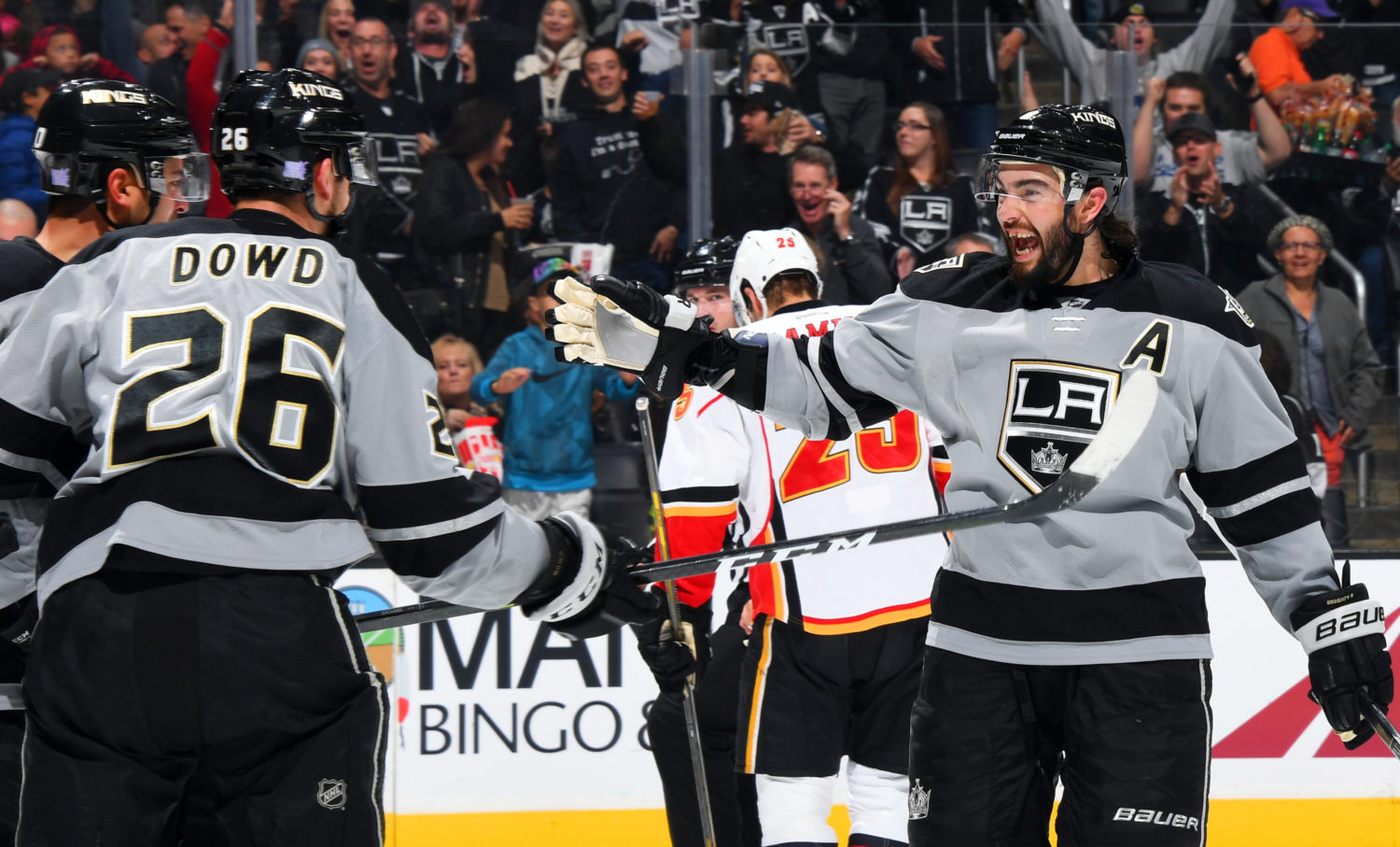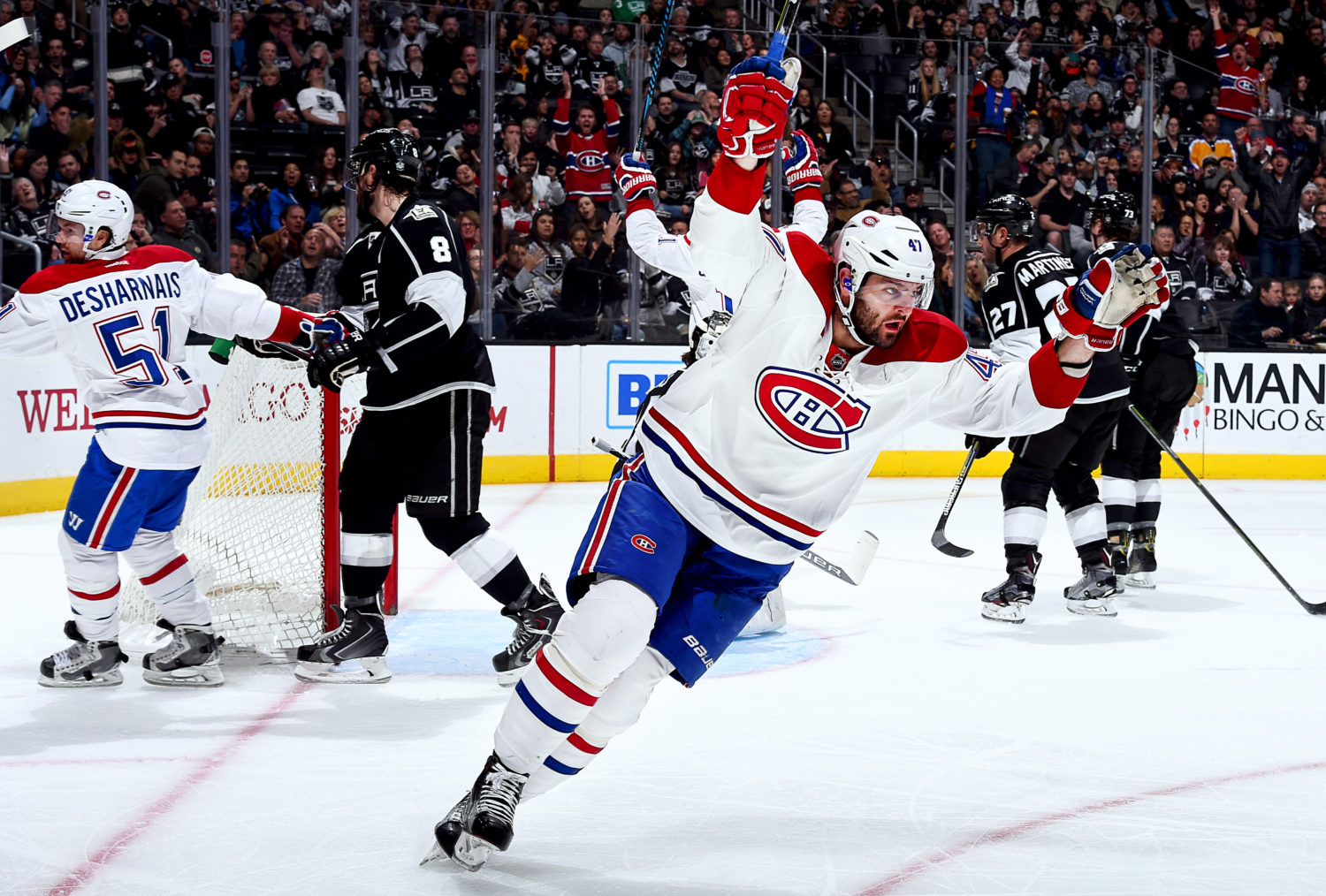Prior to Game 7 of Los Angeles’ 2014 first round playoff series against San Jose, Darryl Sutter was asked about the difference between the first half of the series, in which the Sharks won three games, and the second half of that series, in which the Kings had won the next three.
“Six, seven, four, three, zero, one,” he answered. No, he wasn’t serving as a random number generator. Instead, he was listing the number of goals, game-by-game, that Los Angeles had allowed in the series. (Spoiler: They allowed one in Game 7 and moved on to face Anahiem in the next round.)
It’s a topic that bears repeating in the current part of the Kings’ schedule. During their five-game winning streak last month, they allowed two, two, two, two and one goals. Since then, they’ve allowed four, three and five, and are 1-1-1 even though they’ve averaged three goals per game over that stretch, which is often hockey’s Mendoza Line in determining wins and losses.
“Well, you’re not going to score four or five goals every game, so our main focus right now is to get our goals-against down,” Drew Doughty said. “We want that down in the one and two range because that’s how you win hockey games in this league. Not too many games are won 5-4, they’re always 3-2 or 2-1 so you can’t be giving up four or five goals a game or else you’re just going to lose flat out, so yeah, we want to get that down.”
On the other hand, Los Angeles’ offense has been clicking for the better part of the last month and a half. Since the club endured back-to-back-to-back shutout losses in late October and early November, they’ve averaged 3.07 goals per game over a 15-game stretch. It’s an output made more impressive when considering the team had lost a major top-six force in Milan Lucic to free agency over the summer.
“I think some of our top players have been playing really well,” Nic Dowd said. “They’ve just been putting the puck in the back of the net a lot lately and our power play has been better. I think we’ve had three power play goals in the last five games, maybe. So I think guys are getting more comfortable with each other I’m sure, the lines haven’t changed up too much, and then guys have just been playing well. Lewis has been playing well and Kopi maybe hasn’t found the back of the net a lot, but he’s been making a whole lot of plays that have led to goals for other players.”
Of course, a tenet of the raised goals-against rate has been the recently diminished returns from Peter Budaj. While Budaj has been a major influence in the Kings’ ability to remain afloat and in the playoff mix during a binge of injuries, his play has also come down a notch during the team’s recent 1-1-1 stretch, and Jeff Zatkoff is expected to start in net tonight against the Hurricanes. For more on the team’s increased goals-for and goals-against rate, as well as how some player may serve as an influence for younger players, here’s more from Doughty and Dowd:
Drew Doughty, on whether limiting goals against is tied to tighter checking:
Yep, yep. Tighter checking, more willing to do things defensively in order to create scoring opportunities that way, blocking shots, playing hard on the man. It’s not always about being physical as in the hitting aspect, but just being physical on their sticks and pinning guys on the walls and stuff like that, getting back to those sorts of things ‘cause we pride ourselves on a really good hard-checking game, and we need to get back to it.
Doughty, on whether it’s also about “positional awareness”:
It’s a lot of things. All the things kind of come into it; having possession of the puck, not making turnovers, not getting pinned in our own zone, getting sticks on pucks, making sure we get pucks out, making sure we get them deep. Everything goes into it, there’s not one certain thing we paid special attention to just kind of everything as a whole.
Doughty, on what the team worked on with three days in between games:
Worked on a little bit of conditioning, got in the gym. Get your strength back up to where it needs to be. We worked on transition, both offensively and defensively, worked on the power play a little bit. It wasn’t one certain thing, maybe transition a little bit and how we can be quicker with that in order to keep teams on their heels.
Doughty, on what jumps out at him when he thinks of Carolina:
I don’t really know what to say to that one. I don’t know, we don’t play them very often. They’re not a team I’m going to watch or anything. … There are some fresh faces on that team that some of us haven’t seen so before the game we’ll get a good scout on them and figure out individually how they play and then we’re going to get a scout on their team to figure that out too. So we’ll be well prepared even though we maybe don’t know some of the guys on this team.
Doughty, on whether he’s crossed paths with Justin Faulk before:
I met him once at an All-star game or something like that, but I know he’s got a big shot from the point, pretty highly-skilled defenseman, and yeah, he’s one of their better players so we’ve got to take him out of the game.
Nic Dowd, on improving his own game by watching Carter’s play as a centerman:
You try and learn from all the guys here in different situations, but definitely Kopi and Carts are two guys that have been here for a while and they’re elite players, both all-stars, so watching them I think it makes the game look pretty easy because they play so well but I think there’s some stuff, no matter how much you watch them, it’s intangibles that are tough to learn. Jeff and Kopi both put themselves in really good situations all over the ice before the puck has even arrived and I think Jeff in particular is just a goal scorer. You’ve seen that most of his goals this year have been great shots. But yeah I definitely learn from them, I think from a systems point of view is probably the biggest thing, just where they put themselves in the middle and in the D-zone and neutral zone. And then I think with the O-zone those are just intangibles that each person has, but I definitely think within our system it’s good to learn from those two.
Dowd, on how his playmaking ability has translated to the NHL:
It’s been challenging. I think definitely in the American League, in my first year it was the same issue. You start off with a new team and different needs and then you try to find where you fit in. You’re trying to make plays adjusted to the speed, obviously bigger players, better players, and then you get here and the exact same thing occurs. It’s been peaks and valleys, I think there’s been some really, really good points in the last 25 games, and then I think there’s been some really low points. But I think just trying to find that consistency will allow my game to get better and better.

Aaron Poole / NHLI


Rules for Blog Commenting
Repeated violations of the blog rules will result in site bans, commensurate with the nature and number of offenses.
Please flag any comments that violate the site rules for moderation. For immediate problems regarding problematic posts, please email zdooley@lakings.com.